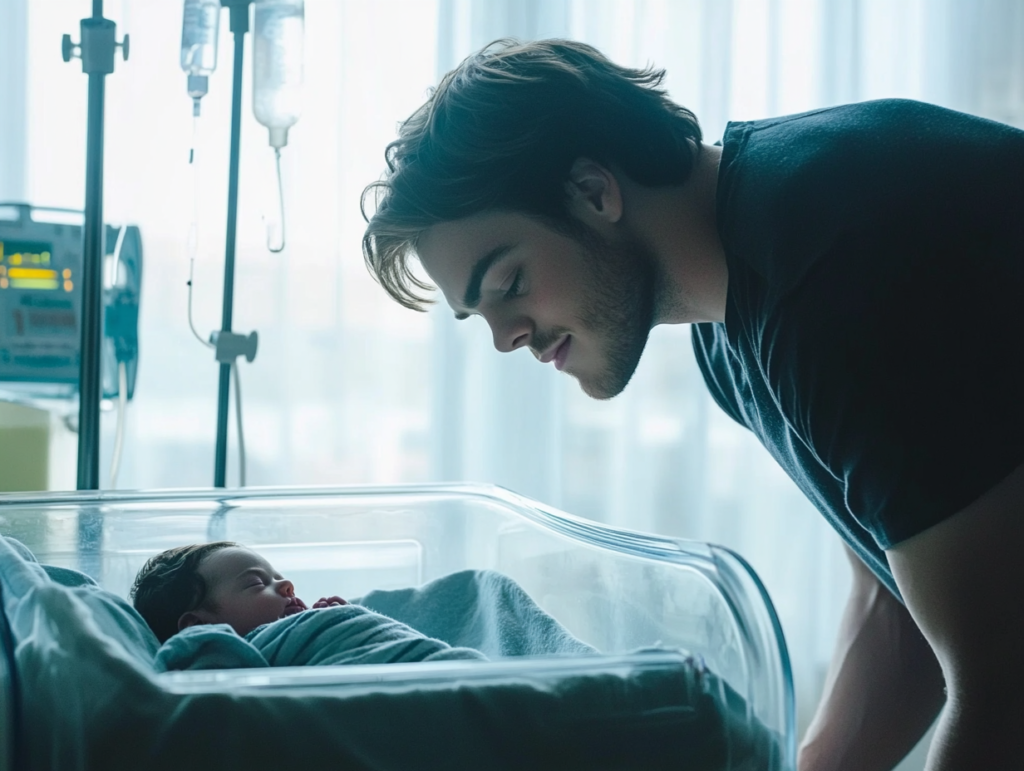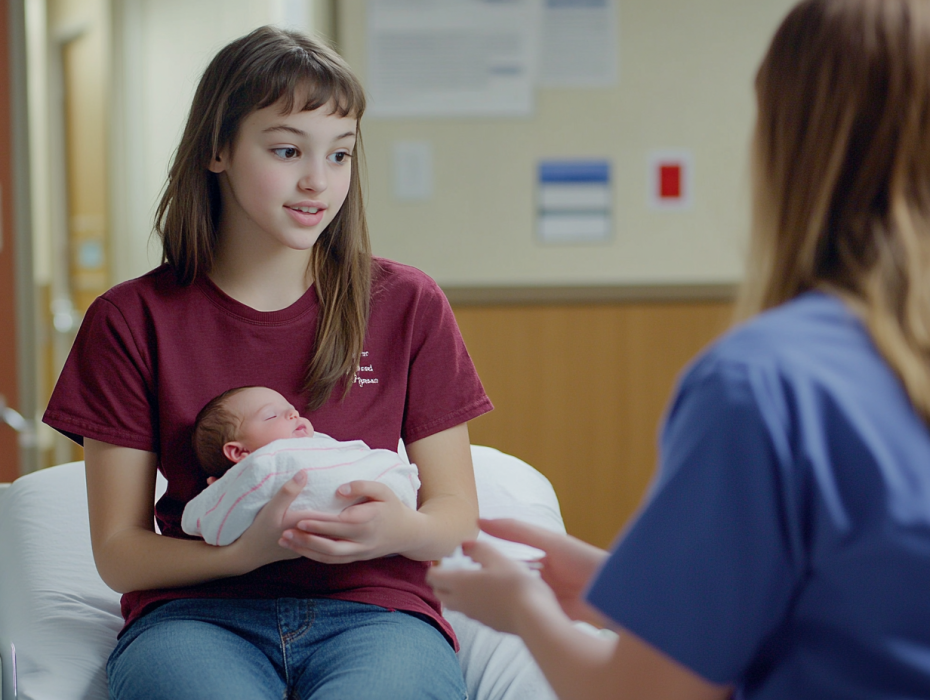The delivery room was chaotic. Monitors were beeping, nurses calling for towels, and the air thick with urgency. Nurse Elise held the trembling hand of a nineteen-year-old girl named Olivia as she pushed through another contraction. Sweat streamed down her temples; her eyes darted toward the door as if expecting someone to burst in.
“You’re doing great,” Elise whispered, squeezing her hand. She nodded once, silent, terrified. When the final cry came, the doctor caught the baby and announced, “It’s a girl.” For a moment, relief flickered across Olivia’s face. Then the doctor asked gently, “Who’s the father?”
The question shattered her composure. Olivia’s shoulders convulsed, and she began to sob uncontrollably. The doctor froze, the clipboard hovering midair. Elise stepped closer, instinctively wrapping her arm around Olivia’s trembling frame. Her tears soaked through her scrubs, each one heavy with something more than pain.
The baby’s first cry pierced the silence, filling the sterile room with life. Yet Olivia didn’t look toward the bassinet. She stared at the ceiling, shaking her head. When Elise leaned in to reassure her, she caught her wrist and whispered, voice trembling, “Please… don’t tell him yet.”

“Don’t tell whom, sweetheart?” Elise asked quietly, but she wouldn’t answer. Her fingers tightened around her wrist before slipping away, limp with exhaustion. The doctor and the nurse exchanged uncertain glances. Protocol demanded they notify the family, but something in her plea made them hesitate.
As the others busied themselves with post-delivery routines, Elise lingered by her bedside. Her breathing steadied, but her eyes remained open—glassy, lost, and fixed on some private terror only she could see. The nurse adjusted her blanket, careful not to disturb her after the ordeal she, her body, her whole being had been through.

Hours later, when the ward settled into its midnight rhythm, Elise returned to check Olivia’s vitals. “Would you like me to call someone?” she asked softly. She blinked once, then turned her head away. “No,” she whispered. “No one for now.”
Elise had met women who wanted silence—out of pride, grief, or fear, but she wasn’t sure which was the case here. It wasn’t emptiness; it seemed to be a defense. Every word she didn’t say felt like a wall she was desperate to keep standing.

The nurse wrote “patient stable” on her chart, but that wasn’t true. There was nothing stable about a girl who couldn’t look at her own child or say the father’s name aloud. Elise should’ve walked away, but something about Olivia’s fragility anchored her to the young mother.
Maybe it was instinct, or guilt—the kind that keeps you past your shift, staring at a stranger because you are afraid of what she’ll face when you leave. Elise pulled up a chair beside her bed and stayed, listening to the faint hum of the monitors, waiting for her to speak, if she could and wanted to.

Morning came slowly, bleeding gold through the blinds. The ward was quieter now, the machines steady, and the world calmer. Olivia sat upright, cradling her baby with a look that wasn’t quite wonder, but not rejection either. “Thank you,” she murmured when she caught the nurse watching, her voice small but steady.
She hadn’t wanted to call anyone through the night. But as dawn broke and the baby whimpered, Elise saw her expression soften. “Maybe my mom,” she whispered finally, almost as if confessing a crime. The nurse handed her the phone, and she stared at it for a long moment before dialing.

Elise expected relief when her mother arrived—a reunion, comfort, and maybe even laughter. Instead, a middle-aged woman in a tailored coat swept into the room like she was entering a board meeting. “Olivia, sweetheart,” she said, smiling thinly. “You gave us quite the scare, not letting us know earlier.”
She introduced herself to the doctor but not to Elise, her eyes skimming over Elise’s name tag as she pulled out a pen. Without reading a single word, she signed every form placed before her. “We’ll handle everything at home,” she said briskly, her tone final, dismissive.

Olivia looked smaller beside her—shoulders drawn and her head lowered. Every time her mother spoke, she nodded automatically, like a child being corrected. Elise couldn’t tell if it was obedience or defeat. The older mother’s calm was polished and felt rehearsed, like someone performing motherhood rather than feeling it.
When Elise tried to ask about follow-up visits, the mother waved her off. “I’ll make sure she rests,” she said. “The father knows the baby’s here, and he’ll check in later.” Olivia’s eyes flicked up at that, a quick, involuntary flinch that didn’t escape Elise.

“And what about support?” Elise asked gently. “Will she have help?” The mother’s smile tightened further. “We have a very private household, Nurse. We’ll manage.” She gathered the baby’s blanket as if to shield both child and secret from the world.
As Elise watched them, unease settled in her chest. There wasn’t any overt cruelty—far from it. But the care discharged looked suffocating. The kind that looks like protection from the outside but feels like control to the person trapped inside it. Elise couldn’t understand why Olivia’s dad hadn’t come. She wondered if the father wasn’t supportive of her choosing to have the baby.

Elise returned to the nurse’s station and wrote quietly in the notes: Patient appears fearful. Family dynamic unclear. Monitor support network. It wasn’t much, but it was all she could do. Sometimes, a single line in a chart is the only lifeline she could leave behind.
When she glanced back into the room, Olivia was feeding her baby while her mother spoke softly into her phone. However, when the mother stepped out, Elise overheard her saying angrily, “Tell him not to make a scene.” Elise froze halfway down the hall. Him could only mean Olivia’s father. The word scene sounded like a warning.

Elise imagined the worst: a man unwilling to face what his daughter had done, the kind who slammed doors and shouted instead of offering help. She’d seen too many girls like Olivia—young, frightened, left to carry both the baby and the blame.
When the man finally arrived that evening, Elise’s guard went up immediately. He was tall, broad-shouldered, in a suit and coat, as if just back from a board meeting. He held himself awkwardly, eyes lowered. A business magnate with an ego?, Elise thought automatically, preparing herself for tension.

But when he looked up, her assumptions faltered. “Hey, sweetheart,” he said softly to Olivia. His voice was rough but kind. He stepped closer, uncertain but warm, and Elise saw Olivia’s face light up with something that looked like relief for the first time since her delivery.
He approached the bassinet as though approaching something sacred. “She’s perfect,” he whispered, brushing the baby’s hand. Then to Olivia he asked, “You okay, kiddo?” His concern was quiet and unshowy, the kind that didn’t need to prove itself. Elise looked away, ashamed of her quick judgment.

When he thanked Elise for “keeping my girl safe,” she caught herself smiling. For a fleeting moment, it seemed Olivia was loved more deeply than she dared believe. But as he left, Elise’s unease returned. Love didn’t always mean safety. She still wondered—what had made Olivia so afraid to begin with?
A day later, Elise spotted a tall man at the reception desk holding a bouquet of lilies. He was handsome in a deliberate way—shirt crisp, smile rehearsed. When he entered Olivia’s room, the girl’s shoulders tensed before she forced a smile. “Daniel,” she said softly, as if testing the name.

Elise observed from the corner, pretending to arrange supplies. Daniel’s charm filled the space like cologne. It was noticeable and almost overwhelming. He thanked the staff, complimented the doctor, and made sure everyone knew he’d “been worried sick.” But his hand on Olivia’s shoulder lingered, pressing too firmly to be affectionate.
Olivia murmured polite things while her eyes darted between his face and the sleeping baby. When Daniel kissed her temple, she flinched so subtly that Elise almost missed it. Almost. Years of experience had trained her to read the language of fear disguised as love.

When Elise approached to check the baby’s vitals, Daniel stepped forward slightly. “You don’t need to take her away,” he said. His tone was smooth but threaded with steel. “She stays with us.” Elise smiled politely, professionally, but felt the chill of a boundary being drawn.
“It’s just a routine check,” Elise replied gently. Daniel’s jaw tightened. “I’ll bring her myself later.” Olivia’s eyes pleaded for Elise to let it go. Against instinct, she nodded and stepped back, her pulse quickening with quiet unease.

As the conversation drifted to feeding schedules and paperwork, Daniel kept his arm around Olivia’s chair like a warning. Elise noted every detail—the tension, the silence, the way Olivia’s laughter sounded more like permission than joy.
Before leaving, Daniel turned to Elise. “What are visiting hours again?” he asked. His tone was casual, but the follow-up questions weren’t. “Are visitors allowed to bring food for patients? Who’s usually on duty at night?” Elise’s stomach tightened. None of this seemed to be just about visiting hours.

“The hospital has everything covered and our canteen offers wholesome food,” she replied evenly, hiding her discomfort. Daniel nodded, smiling as if that had been the right answer. Then he leaned down, whispered something to Olivia, and left the room, leaving the lilies behind.
Silence fell as soon as the door clicked shut. Olivia sat very still, her eyes fixed on the empty doorway. When Elise finally spoke, it was almost a whisper. “You okay?” Olivia nodded, but the gesture was automatic, empty.

“He means well,” she said finally, adjusting the baby’s blanket. “He just… worries…a lot.” Elise forced a reassuring smile, but inside, she wasn’t convinced. Worry shouldn’t usually look like control, or sound like a locked door closing behind you.
During the morning rounds, Elise adjusted the blood pressure cuff on Olivia’s arm and noticed faint purple marks just above the elbow. “Those from the IV tape?” she asked lightly. Olivia nodded too quickly, eyes fixed on the floor. “Yeah. I think so. My skin bruises easily.”

Elise made a note but didn’t comment. She’d heard the same explanation from dozens of women before, and sometimes it was true. Sometimes it wasn’t. She tightened the cuff, silently counting the seconds while Olivia stared straight ahead, breathing as if under interrogation.
When the reading was done, Elise smiled gently, “You’re healing well.” Olivia murmured a thank-you, clutching the baby close. Her shoulders stayed rigid, as if reassurance itself had become something dangerous to trust.

Later that day, the social worker stopped by. Elise lingered in the hallway, listening through the slightly ajar door. Olivia’s voice carried in fragments. It seemed steady but rehearsed. “Everything’s fine. Daniel’s the protective kind. He just worries I’ll overdo it.”
The words were calm, but Elise thought she caught the tremor underneath, like a wire straining under weight. The social worker left satisfied, clipboard full of ticked boxes, and Elise felt a flash of frustration. How neatly could fear masquerade as stability?

When Elise entered again to deliver medication, Olivia was folding baby clothes with slow precision. She looked up and said, “They always think something’s wrong.” Elise wanted to say, Because something feels wrong love, but she swallowed it, choosing to smile silently rather than to confront.
That afternoon, Daniel appeared unannounced. Elise watched from the nurses’ station as he stepped into the room. Olivia’s posture changed immediately—shoulders up and smile fixed. Her phone screen lit up once, then she deleted something before he noticed. Then she turned it face down. Elise caught the subtle but unmistakable gesture.

When Daniel finally left, Olivia’s laughter followed him down the corridor. It was thin, strained, and ended too soon. Elise leaned against the counter, exhaustion sinking in like gravity. She couldn’t tell whether she was imagining danger or witnessing it unfold in slow motion.
That evening in the staff room, she confided in her colleague, Marta. “If she shows any more signs of bruising—I’m calling it in,” Elise said. Marta nodded, silent. They both knew it was a promise most nurses make too late.

A month passed. The hospital moved through its usual rhythm of births, tears, and recoveries, and Elise almost convinced herself she’d overreacted. Maybe Daniel was a bit controlling, but not cruel. Maybe Olivia’s silence was just youth, and not fear.
Then one morning, Elise found her name on the day’s patient list—Olivia Harper, postpartum checkup. A quiet relief washed over her, followed instantly by unease. She hoped that everything had turned out all right and wondered what she would do otherwise.

When Olivia walked in, alone and carrying her baby, Elise exhaled softly. The girl looked healthier, calmer, her hair tied neatly, and her eyes clearer. But beneath the surface calm, something cautious still flickered, like a flame shielded by cupped hands.
During the exam, Olivia smiled more freely, even laughed once when the baby sneezed. Yet whenever Elise mentioned paperwork or follow-ups, her gaze darted away, as though certain words could summon ghosts. “How’s home?” Elise asked casually, listening for hesitation.

“Better,” Olivia said after a pause. “Mom moved me into the guesthouse. It’s quiet there.” Her voice was steady, but Elise caught a flicker of relief. Elise jotted down notes and tried not to press. “And Daniel?” she asked lightly. Olivia hesitated. “He visits when he can.” The phrasing was careful, deliberate. A practiced balance between truth and protection.
Elise wanted to believe her. She wanted to believe this girl had found peace, or at least distance and space to protect her. But experience had taught her that calm often arrived just before the storm decided to turn back.

The appointment wrapped up in small talk—feeding schedules, sleep, and weather. As Olivia dressed the baby, Elise found herself watching the girl’s hands. They were steady, gentle, and far older than nineteen.
At the door, Olivia turned suddenly. “You were so kind to me that night,” she said softly. “Not everyone is, to a single mother.” The words caught Elise off guard. They contained simple gratitude, yet were heavy with memory.

Elise smiled, masking the chill that crept up her spine. “You’re stronger than you think,” she said. But as Olivia disappeared down the hallway, Elise couldn’t shake the feeling that something fragile still trembled beneath the surface calm, something that hadn’t yet been spoken.
In the following weeks, Olivia began stopping by the hospital more often—first for check-ups, and then for small questions that could have easily been answered over the phone. Elise didn’t mind. The young mother’s visits broke the monotony of her shifts and softened the ward’s sharp edges.

They started talking in the quiet moments between appointments. They were about sleepless nights, and the ache of loving something so small and helpless. Olivia spoke with surprising insight for nineteen, but her voice always carried a trace of guilt, as if she didn’t deserve the baby she adored.
Elise found herself listening more than advising. The bond that had begun with her fear for the younger woman evolved into something gentler. They were two women, divided by years but bound by exhaustion and secrets neither could fully name.

One afternoon, while Olivia adjusted the baby’s blanket, Elise asked carefully, “Are you safe, sweetheart?” The words hung heavy in the sterile air. Olivia’s hands froze mid-fold before she exhaled. “Daniel’s… intense,” she said slowly. “He plans everything. Even wanted to name her. But she is my Hope.”
Elise tilted her head. “Plans?” Olivia gave a small, uncertain smile. “He likes order and method—feeding schedules and nappy changes and so on. He thinks life works better when we plan ahead.” She looked away, brushing invisible lint from her sleeve, her tone flat as a recited line.

Elise recognized the pattern—control wrapped in affection, boundaries disguised as care. She suggested counseling, softly, without judgment. Olivia only smiled—a sad, knowing curve of the lips. “He wouldn’t understand,” she murmured.
That night, Elise couldn’t shake the image of the girl’s hands—so young, yet already burdened with the careful restraint of someone who’d learned to measure every word. She wrote a reminder to follow up discreetly, even if Olivia insisted everything was fine.

Days later, Olivia returned carrying a small bouquet of lilies and daisies. “Just a thank-you,” she said, cheeks flushing pink. Elise laughed softly, touched by the gesture but uneasy at the formality of it.
Tucked between the flowers was a folded card. Elise opened it after her shift. In neat, looping handwriting, it read: For the friend who listens unconditionally. The simplicity of the sentence made her chest tighten.

She placed the card inside her locker, next to her ID badge. It wasn’t the first time a patient had trusted her with more than their medical story—but this felt different. Olivia wasn’t just confiding. She was confessing, in slow motion.
It was a gray Tuesday when a man appeared at the front desk asking for information on Olivia Harper. Elise noticed him immediately. He had a nervous energy beneath polite manners. He handed over a small envelope and said he couldn’t stay long. The return name on the envelope only read, “A”.

The receptionist called Elise because she knew Elise knew Olivia. “She’s not scheduled today,” Elise told him, but curiosity tugged at her. The man looked harmless. He was young, maybe in his early twenties, and his clothes were simple but clean. “Could you give this to her when she’s in?” he asked softly.
Later that afternoon, when Olivia stopped by with the baby, Elise handed her the envelope. She expected mild curiosity, maybe a smile from the girl. Instead, Olivia’s face drained of color. Her hands trembled as she read the single letter on the card: A.

“Is something wrong?” Elise asked. Olivia shook her head quickly. “No, it’s nothing,” she said, forcing a laugh that cracked at the edges. “Please, don’t mention this to anyone. Not my mom, nor Daniel, if they come with me. Promise me.”
The urgency in her tone startled Elise. “Of course,” she said. “You have my word.” But even as she spoke, unease prickled down her spine. Whatever this letter meant, Olivia clearly didn’t want it seen.

That night, the nurses’ lounge buzzed with gossip. Marta leaned across the table, whispering, “That guy who dropped off the note? Handsome. Looked nervous, though, like a kid about to confess something.” Elise kept her face neutral, pretending to care less than she did.
“Did he say anything?” another nurse asked. Marta shrugged. “Just asked if Olivia still came by. We couldn’t reveal anything about her or the baby, patient confidentiality, of course. Said he was an old friend.” The word friend lingered in Elise’s mind like a half-solved equation.

The next morning, Olivia arrived early. She seemed tired and distracted, clutching her baby tighter than usual. Elise decided to ask gently, “The man who came by and left you the note. Why didn’t he just come visit you at home?”
Olivia hesitated, then exhaled. “He’s someone from before,” she said. “I thought he’d moved on.” The confession was quiet but said everything, a stone dropped in still water. Elise nodded slowly, piecing it together—an ex-boyfriend, maybe. A past that refused to stay buried.

Yet something didn’t fit. The fear on Olivia’s face hadn’t looked like heartbreak; it looked more than that. Elise couldn’t help wondering: why such panic over a man from the past? What exactly had she been so desperate to keep hidden?
They sat in the small counseling room at the end of the corridor, the walls painted in muted blues meant to calm frayed nerves. Olivia hadn’t spoken for minutes, just traced slow circles on her baby’s blanket. Finally, she looked up and whispered, “Did you think he hurt me?”

Elise hesitated, then nodded slightly. “I was afraid of that,” she admitted. Olivia’s eyes filled with tears. “He didn’t,” she said softly. “Nobody did.” The words cracked open something heavy in the room, a truth that had been pressing against silence for too long.
Her voice trembled as she went on. “I don’t know who the father is,” she confessed. “I was with Aaron for three years. Then Daniel came along just after we broke up… the timing overlapped.” She covered her face with her hands, her shoulders shaking. “I thought I could pretend until it all made sense.”

Elise felt her throat tighten. All the fragments—the secrecy, the panic, the bruises that weren’t bruises—fell into place. Olivia hadn’t been trapped by violence but by shame, by the fear of losing everyone she cared about if she dared to tell the truth.
The air shifted around them, quieter somehow, tender. Elise realized that what she’d mistaken for danger had been the quiet agony of a girl carrying two loves, one mistake, and the crushing uncertainty of what it meant for her child.

Elise reached across the table, her voice low but steady. “You’re not alone, Olivia,” she said. “Some secrets are not worth keeping, and truth can heal. For your peace and your baby’s, find out. Do a paternity test when you’re ready. You’ll find the clarity you seek. And then you can decide.”
Olivia nodded, wiping her cheeks with the back of her hand. The baby stirred, making a soft sound that almost felt like agreement. “I thought the truth would destroy everything,” she said, voice breaking. “Maybe it’s what will finally make things right. I love Daniel, but I don’t know how he’ll take it if Hope is not his.”

Elise smiled gently. “You don’t have to decide today. Just know that whatever the result, you still get to be her mother, and that’s what matters most.” The words seemed to root Olivia, grounding her in a new kind of certainty.
Together they discussed small next steps—counseling, legal guidance, privacy protections. Elise promised to keep their conversation confidential until Olivia was ready. “You’ve already done the hardest part,” she said. “You stopped lying to yourself.”

When Olivia stood to leave, the baby nestled against her shoulder, Elise felt something inside her unclench. The girl who had once trembled through labor now walked with a quiet resolve, fragile but forward-moving.
As mother and child disappeared down the corridor, morning sunlight spilled through the glass doors, soft and gold. Elise watched them go, remembering that first night, the question that had shattered the room, and thought how sometimes, the hardest answer is always worth seeking.

Long after her shift ended, Elise sat alone in the dim staff lounge, the hum of vending machines filling the silence. She thought about all the women who’d crossed her path—some broken, some brave, most both. Olivia’s story exemplified the courage to face uncertainty and still choose love anyway.
